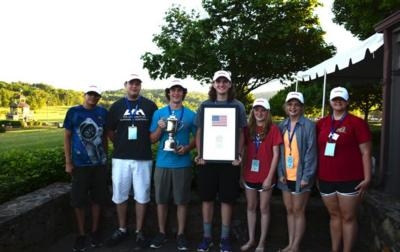Russellville City School Team Declared National Champions, Will Compete In International Rocketry Challenge In June
The RCS Engineers Rocketry Team from Russellville, AL beat out 100 competitors to claim first place at the National Finals of the 2015 Team America Rocketry Challenge (TARC). After months of rocketry design, test flights and qualification launches, hundreds of students from across the country traveled to Great Meadow in the Plains, VA to vie for the title of champion of the largest rocketry competition in the world.
The Russellville City School students bested nearly 700 teams that participated in this year's competition from 48 states, the District of Columbia, Puerto Rico and the U.S. Virgin Islands. The winning team, comprised of Christian Ruiz (16), Niles Butts (16), Andrew Heath (17), Katie Burns (12), Evan Swinney (17), Emma Studdard (14), and Chelsea Suddith (15), was awarded more than $20,000 in prizes and funds for their school.
Structured to emulate the aerospace industry's engineering design process, TARC challenged teams to design and build a model rocket that could travel to a height of 800 feet and back within 46 to 48 seconds. This year's rules required each rocket to carry one raw egg that had to be safely returned to the ground uncracked. Scores were determined by how close the rockets came to the required height and time; damaged eggs disqualified flights.
"We had high aspirations coming into the finals and it's incredibly exciting that we performed as well as we did," said Team Captain Andrew Heath. "It just goes to show that anybody can accomplish their goals with enough hard work."
This year's competition had a twist to the scoring that challenged students' ingenuity and rocket adaptability. The top 42 teams that advanced to the second round at the finals were required to meet new scoring parameters, launching their rockets to 775 feet and coming back to earth within 45 to 47 seconds.
"The innovation and technical know-how demonstrated by today's competitors shows us the future of rocket science is very bright," said Pamela Erickson, vice president of Corporate Affairs for Raytheon. "Creating supportive environments for students to work together to expand their horizons serves everyone's future."
Teams were competing for a total of $100,000 in prizes and scholarships and as in golf, the lowest score wins. TARC teams were aiming for a perfect score of zero, and the RCS Engineers achieved an impressive combined score of 16.16 – less than half of the second place team's total score. In addition to their winnings, the students will travel to Paris this June courtesy of Raytheon Company to represent the United States in an international fly-off at the Paris Air Show against teams from the UK and France.
(Image provided by TARC)

